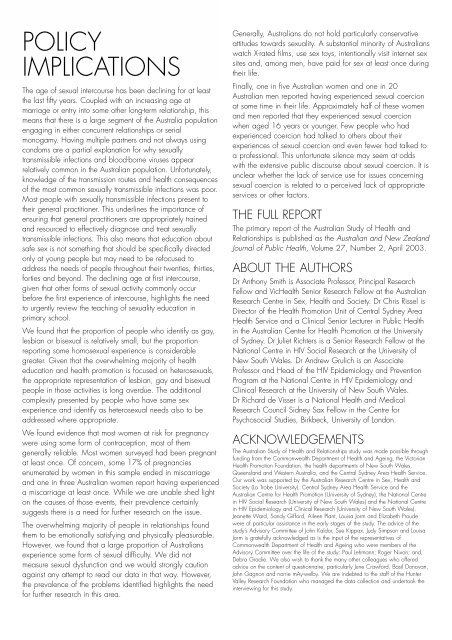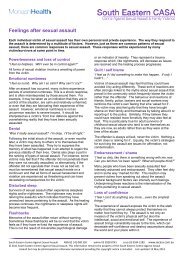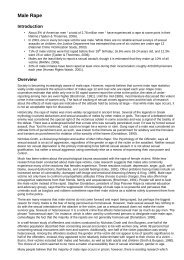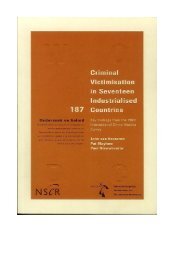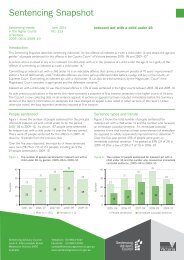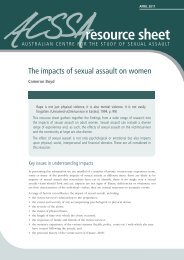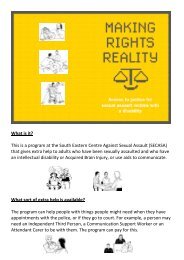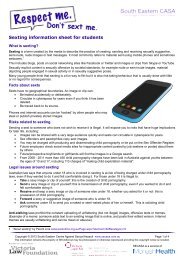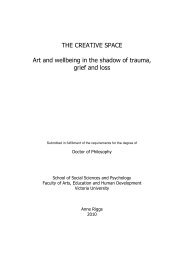Sex In Australia Summary - Health and health care for lesbian ...
Sex In Australia Summary - Health and health care for lesbian ...
Sex In Australia Summary - Health and health care for lesbian ...
You also want an ePaper? Increase the reach of your titles
YUMPU automatically turns print PDFs into web optimized ePapers that Google loves.
POLICY<br />
IMPLICATIONS<br />
The age of sexual intercourse has been declining <strong>for</strong> at least<br />
the last fifty years. Coupled with an increasing age at<br />
marriage or entry into some other long-term relationship, this<br />
means that there is a large segment of the <strong>Australia</strong> population<br />
engaging in either concurrent relationships or serial<br />
monogamy. Having multiple partners <strong>and</strong> not always using<br />
condoms are a partial explanation <strong>for</strong> why sexually<br />
transmissible infections <strong>and</strong> blood-borne viruses appear<br />
relatively common in the <strong>Australia</strong>n population. Un<strong>for</strong>tunately,<br />
knowledge of the transmission routes <strong>and</strong> <strong>health</strong> consequences<br />
of the most common sexually transmissible infections was poor.<br />
Most people with sexually transmissible infections present to<br />
their general practitioner. This underlines the importance of<br />
ensuring that general practitioners are appropriately trained<br />
<strong>and</strong> resourced to effectively diagnose <strong>and</strong> treat sexually<br />
transmissible infections. This also means that education about<br />
safe sex is not something that should be specifically directed<br />
only at young people but may need to be refocused to<br />
address the needs of people throughout their twenties, thirties,<br />
<strong>for</strong>ties <strong>and</strong> beyond. The declining age at first intercourse,<br />
given that other <strong>for</strong>ms of sexual activity commonly occur<br />
be<strong>for</strong>e the first experience of intercourse, highlights the need<br />
to urgently review the teaching of sexuality education in<br />
primary school.<br />
We found that the proportion of people who identify as gay,<br />
<strong>lesbian</strong> or bisexual is relatively small, but the proportion<br />
reporting some homosexual experience is considerable<br />
greater. Given that the overwhelming majority of <strong>health</strong><br />
education <strong>and</strong> <strong>health</strong> promotion is focused on heterosexuals,<br />
the appropriate representation of <strong>lesbian</strong>, gay <strong>and</strong> bisexual<br />
people in those activities is long overdue. The additional<br />
complexity presented by people who have same sex<br />
experience <strong>and</strong> identify as heterosexual needs also to be<br />
addressed where appropriate.<br />
We found evidence that most women at risk <strong>for</strong> pregnancy<br />
were using some <strong>for</strong>m of contraception, most of them<br />
generally reliable. Most women surveyed had been pregnant<br />
at least once. Of concern, some 17% of pregnancies<br />
enumerated by women in this sample ended in miscarriage<br />
<strong>and</strong> one in three <strong>Australia</strong>n women report having experienced<br />
a miscarriage at least once. While we are unable shed light<br />
on the causes of those events, their prevalence certainly<br />
suggests there is a need <strong>for</strong> further research on the issue.<br />
The overwhelming majority of people in relationships found<br />
them to be emotionally satisfying <strong>and</strong> physically pleasurable.<br />
However, we found that a large proportion of <strong>Australia</strong>ns<br />
experience some <strong>for</strong>m of sexual difficulty. We did not<br />
measure sexual dysfunction <strong>and</strong> we would strongly caution<br />
against any attempt to read our data in that way. However,<br />
the prevalence of the problems identified highlights the need<br />
<strong>for</strong> further research in this area.<br />
Generally, <strong>Australia</strong>ns do not hold particularly conservative<br />
attitudes towards sexuality. A substantial minority of <strong>Australia</strong>ns<br />
watch X-rated films, use sex toys, intentionally visit internet sex<br />
sites <strong>and</strong>, among men, have paid <strong>for</strong> sex at least once during<br />
their life.<br />
Finally, one in five <strong>Australia</strong>n women <strong>and</strong> one in 20<br />
<strong>Australia</strong>n men reported having experienced sexual coercion<br />
at some time in their life. Approximately half of these women<br />
<strong>and</strong> men reported that they experienced sexual coercion<br />
when aged 16 years or younger. Few people who had<br />
experienced coercion had talked to others about their<br />
experiences of sexual coercion <strong>and</strong> even fewer had talked to<br />
a professional. This un<strong>for</strong>tunate silence may seem at odds<br />
with the extensive public discourse about sexual coercion. It is<br />
unclear whether the lack of service use <strong>for</strong> issues concerning<br />
sexual coercion is related to a perceived lack of appropriate<br />
services or other factors.<br />
THE FULL REPORT<br />
The primary report of the <strong>Australia</strong>n Study of <strong>Health</strong> <strong>and</strong><br />
Relationships is published as the <strong>Australia</strong>n <strong>and</strong> New Zeal<strong>and</strong><br />
Journal of Public <strong>Health</strong>, Volume 27, Number 2, April 2003.<br />
ABOUT THE AUTHORS<br />
Dr Anthony Smith is Associate Professor, Principal Research<br />
Fellow <strong>and</strong> Vic<strong>Health</strong> Senior Research Fellow at the <strong>Australia</strong>n<br />
Research Centre in <strong>Sex</strong>, <strong>Health</strong> <strong>and</strong> Society. Dr Chris Rissel is<br />
Director of the <strong>Health</strong> Promotion Unit of Central Sydney Area<br />
<strong>Health</strong> Service <strong>and</strong> a Clinical Senior Lecturer in Public <strong>Health</strong><br />
in the <strong>Australia</strong>n Centre <strong>for</strong> <strong>Health</strong> Promotion at the University<br />
of Sydney. Dr Juliet Richters is a Senior Research Fellow at the<br />
National Centre in HIV Social Research at the University of<br />
New South Wales. Dr Andrew Grulich is an Associate<br />
Professor <strong>and</strong> Head of the HIV Epidemiology <strong>and</strong> Prevention<br />
Program at the National Centre in HIV Epidemiology <strong>and</strong><br />
Clinical Research at the University of New South Wales.<br />
Dr Richard de Visser is a National <strong>Health</strong> <strong>and</strong> Medical<br />
Research Council Sidney Sax Fellow in the Centre <strong>for</strong><br />
Psychosocial Studies, Birkbeck, University of London.<br />
ACKNOWLEDGEMENTS<br />
The <strong>Australia</strong>n Study of <strong>Health</strong> <strong>and</strong> Relationships study was made possible through<br />
funding from the Commonwealth Department of <strong>Health</strong> <strong>and</strong> Ageing, the Victorian<br />
<strong>Health</strong> Promotion Foundation, the <strong>health</strong> departments of New South Wales,<br />
Queensl<strong>and</strong> <strong>and</strong> Western <strong>Australia</strong>, <strong>and</strong> the Central Sydney Area <strong>Health</strong> Service.<br />
Our work was supported by the <strong>Australia</strong>n Research Centre in <strong>Sex</strong>, <strong>Health</strong> <strong>and</strong><br />
Society (La Trobe University), Central Sydney Area <strong>Health</strong> Service <strong>and</strong> the<br />
<strong>Australia</strong>n Centre <strong>for</strong> <strong>Health</strong> Promotion (University of Sydney), the National Centre<br />
in HIV Social Research (University of New South Wales) <strong>and</strong> the National Centre<br />
in HIV Epidemiology <strong>and</strong> Clinical Research (University of New South Wales).<br />
Jeanette Ward, S<strong>and</strong>y Gif<strong>for</strong>d, Aileen Plant, Louisa Jorm <strong>and</strong> Elizabeth Proude<br />
were of particular assistance in the early stages of the study. The advice of the<br />
study’s Advisory Committee of John Kaldor, Sue Kippax, Judy Simpson <strong>and</strong> Louisa<br />
Jorm is gratefully acknowledged as is the input of the representatives of<br />
Commonwealth Department of <strong>Health</strong> <strong>and</strong> Ageing who were members of the<br />
Advisory Committee over the life of the study: Paul Lehmann; Roger Nixon; <strong>and</strong>,<br />
Debra Gradie. We also wish to thank the many other colleagues who offered<br />
advice on the content of questionnaire, particularly June Craw<strong>for</strong>d, Basil Donovan,<br />
John Gagnon <strong>and</strong> norrie mAy-welby. We are indebted to the staff of the Hunter<br />
Valley Research Foundation who managed the data collection <strong>and</strong> undertook the<br />
interviewing <strong>for</strong> this study.


